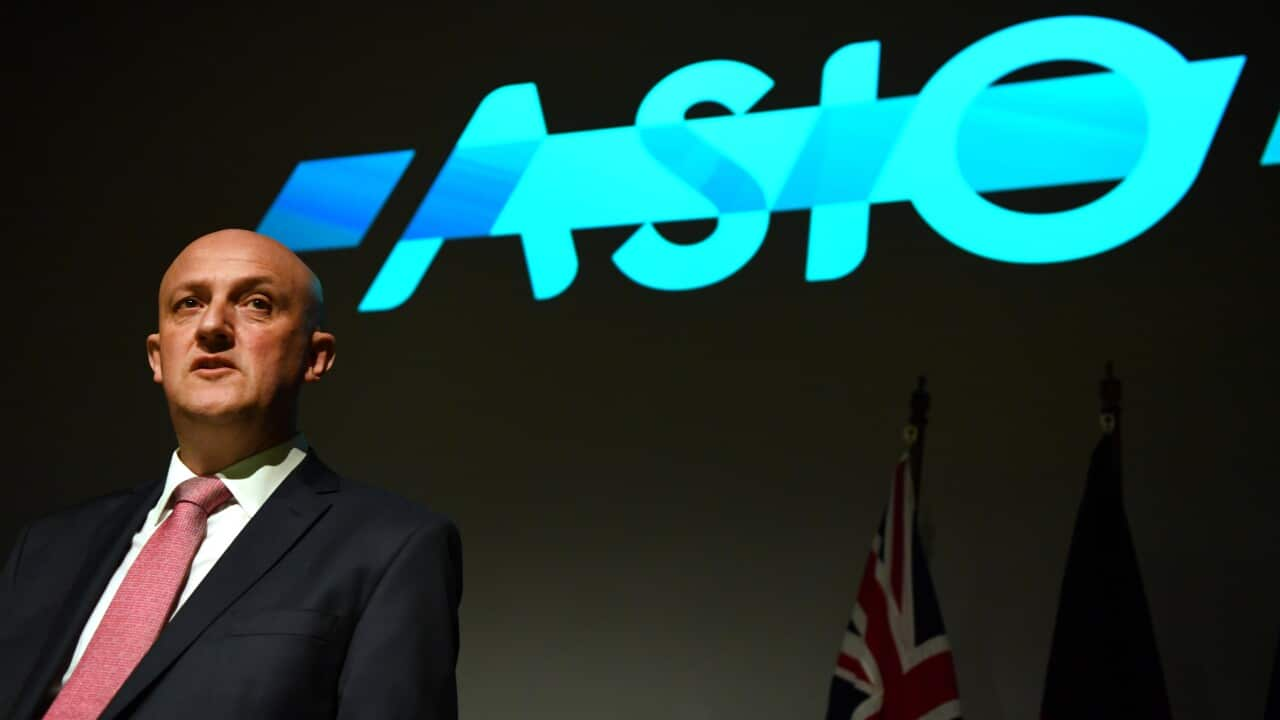KEY POINTS:
- Muslim advocacy group calls for ASIO to scrap 'religious' definition for terrorism.
- Spy agency defines terror groups as either 'ideologically' or 'religiously' motivated.
- Parliament reviewing listing of proscribed terror organisations.
ASIO is encouraging both Islamist extremists and racists by saying groups such as the self-proclaimed Islamic State group (IS) and al-Qaeda are "religiously motivated", a peak Muslim body has warned.
The Australian Muslim Advocacy Network (AMAN) has also accused the spy body of taking a softer touch to young right-wing extremists than their Muslim equivalents, who it claims are more likely to be tried as adults rather than being rehabilitated.
ASIO shifted its definition of extremist groups in early 2021 - - as security agencies warned the threat of far-right extremism in Australia was growing.

Fighters of the self-proclaimed Islamic State in Raqqa, Syria, in 2015. A peak muslim advocacy body that ASIO is encouraging both Islamist extremists and racists by saying groups such as the self-proclaimed Islamic State group (IS) and al-Qaeda are "religiously motivated". Source: AAP
He insisted the shift was made with Australia's Muslims in mind.
"It’s violence that is relevant to our powers, but that’s not always clear when we use the term ‘Islamic extremism’,” he said.
“Understandably, some Muslim groups, and others, see this term as damaging and misrepresentative of Islam, and consider that it stigmatises them by encouraging stereotyping and stoking division."

An Australian far-right extremist killed 51 Muslims in Christchurch, NZ in 2019. Source: AP
'Powerful community grievance'
But AMAN said the approach had the double effect of supporting IS's claims that its atrocities are a "religious endeavour", while also feeding the belief that Muslims are radicalised by their faith.
In a submission to the Parliamentary Joint Committee on Intelligence and Security (PJCIS), it urged ASIO to scrap the term "religiously motivated" altogether, replacing it with a more "neutral" designation: "politically" motivated.
"The [current] distinction misrepresents what is at the core of violent ideology, by positioning a religion and religious texts as a violent ideology or program in itself," it said.
"Official speech is extremely influential and authoritative in media and online discourse, providing powerful reinforcement for ISIS and racist nationalist movements."
The Department of Home Affairs did not respond to SBS News' request for comment.
The PJCIS is currently reviewing the way Australia's security agencies designate terror organisations.
ASIO warned the COVID-19 pandemic has complicated the extremism landscape, including a rising threat from fringe conspiracy groups.
But despite far-right extremists now taking up roughly half of ASIO's workload, right-wing groups account for just three of 29 officially proscribed [forbidden by law] terror organisations in Australia. Twenty-five are Islamist extremist groups, including four variants of al-Qaeda and seven of IS.
No 'perfect balance'
AMAN claim under-proscribing far-right groups has created a disparity in the way young offenders are treated, citing a 15-year old Muslim boy charged with terror offences in Adelaide.
"Muslim youth socialising ISIS material are more likely to be treated through prosecution for terrorism conspiracy. In contrast, teenagers socialising white supremacist material are more likely to benefit from diversion approaches," it said.
"The different approaches to handling accused persons based on their ideology cause powerful community grievance, given the degree of existing trauma in the Muslim community arising from stigma and discrimination."

But Dr Zammit, whose research focuses on terrorism and security issues, said he was sceptical of claims the way groups are proscribed had created an inequity, saying its effects on actual terror charges was "not clear cut".
"The overwhelming majority of Muslims who have been charged with terrorism offences in Australia were not charged with proscription-related offences, so proscribing more extreme-right organisations is not likely to significantly change the balance between Muslims and non-Muslims charged with terrorism offences," he said.
While a "consistent criteria" needed to applied when proscribing terror groups, Dr Zammit said the focus should not be on striking a "perfect balance" between ideologies.
"The key questions should be specific to the group, such as: What is this group's terrorist track record, has it actually perpetrated any terrorist attacks, and how many? And what Australian involvement has there been with this group?" he said.










